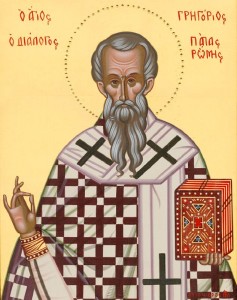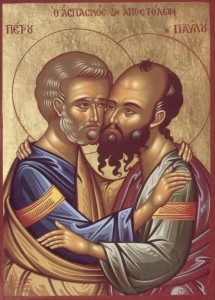Today we celebrate the martyrdoms of Peter and Paul, twin pillars of the Roman Church, the Rock and the Apostle. Both of these men learned the hard way what Paul was to make into a famous maxim. All Christians would do well to adopt it.
When I am weak, then I am strong.
Second Corinthians is such a lovely letter, filled with brutally honest pathos: “We do not want you to be ignorant brethren, of the affliction we experienced in Asia; for we were so utterly, unbearably crushed that we despaired of life itself. Why, we felt that we had received the sentence of death; but that was to make us rely not on ourselves but on God who raises the dead.” [2 Cor 1: 8-9]
Peter suffered as well. In the gospel from the Vigil Mass for today’s feast, Jesus says to Peter, “When you were young, you girded yourself and walked where you would; but when you are old, you will stretch out your hands, and another will gird you and carry you where you do not wish to go….Follow me.” [John 21: 18-19] John the Evangelist glosses the Lord’s prophecy, saying, “This he said to show by what death [Peter] was to glorify God.”
Peter had already been through a terrible trial. The Crucifixion was a trial too heavy for almost all of the Apostles, but Peter left himself particularly vulnerable by swearing that he would die with Jesus. And not only did he fail at this, but he publicly denied even knowing his master. Instead of prophetic witness versus the mob violence directed against an innocent man, Peter allowed himself to become complicit in Jesus’s murder. He thought that he was strong, but in the end, he was no better than the average sinner in the crowd. “And the Lord turned and looked at Peter. And Peter remembered the word of the Lord…and he went out and wept bitterly [Luke 22: 61, 62].”
It is when Peter stops relying on his own strength, even allows himself to be bound and led where he doesn’t wish to go, that God can act through him for His own glory. When Peter is weak, he is strong because he is relying on God.
Paul also thought that he was strong. And he also discovered to his own horror and desolation that he, too, was complicit in the murder of Jesus Christ. “Saul, still breathing threats and murder against the disciples of the Lord” went to Damascus to round up Christians, presumably to be put to death as was Stephen, of whose death Saul approved. When Saul is thrown to the ground, he hears a voice saying, “Saul, Saul, why do you persecute me?” [Acts 9: 4]
“Who are you, Lord?”
“I am Jesus, whom you are persecuting.”
Saul will spend over ten years dying to himself, to the proud, talented young Pharisee who had been certain of the rectitude of his cause, certain of the need to stamp out the disciples of the new Christian Way. When he returns with Barnabas, he has become Paul, Apostle to the Gentiles. He, too, will ultimately give his life for the Lord and be buried in the same city as Peter, who had extended to the young convert “the right hand of fellowship.” [Galatians 2: 9]
Are we as Catholics ready to be weak, that the power of God may truly work through us?
I attended a planning meeting for the upcoming Synod on the Family two months ago, an Archdiocesan session with Archbishop Cupich. The discussions were quite productive, and I noticed that many of the participants, all religious superiors or formators, shared with me an unease about the lineamenta (preparatory document) drawn up by last year’s extraordinary Synod. It wasn’t the content the nettled me. Rather the tone was the usual document-by-committee style that episcopal conferences and synods fall into. And its a tone that has a history in the Church going back to the First Council of Nicea. I don’t think that it would be uncharitable to describe the tone as partaking of a certain triumphalism. In some contexts, this is fine. The Church today prays, “grant, we pray, that your Church may in all things follow the teaching of those through whom she received the beginnings of right religion.” We believe the teachings of the Church because they are true, and how blessed we are to know the truth!

St. Gregory the Great: “Insofar as I succeed at preaching, I myself do not live according to my own preaching.”
Alas, we do not always live as if we knew the truth. Because the truth of the faith is also this: that “Knowledge puffs up” [1 Cor 8: 1], and that “there is none that does good, no, not one.” [Ps. 53: 3] Pope Saint Gregory the Great devotes the long first part of his Pastoral Rule to warning future priests and bishops about this problem. Yet the Church has good news to offer to the suffering of the world, and there is no doubt that families are suffering. Speaking now as a member of the hierarchy, the question I ask myself is this. Do the words of Hosea, spoken to the priests, apply here? Are God’s people being “destroyed for lack of knowledge?” [Hos 4: 6]
This is to say that our approach to questions on the family, on marriage, and on sexuality should probably begin with the practice of repentance. How complicit have I been in the unraveling of the Church in the West? The Church gave the world the glories of Western culture. Now we’ve lost our position of strength. Who are we to blame? The illness has come from within.
Such an acknowledgement offers a different possibility, to address our friends, our foes and the indifferent from a stance of weakness. Trying out how this looks and sounds will be one of the projects of this blog.
